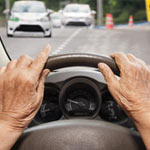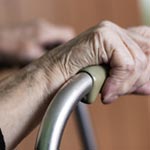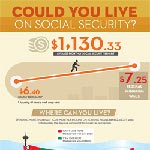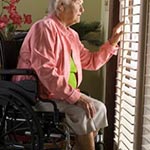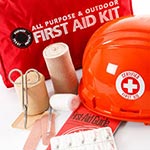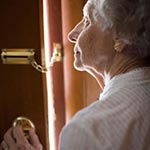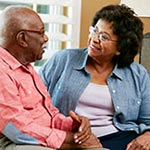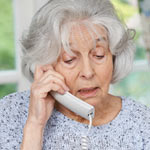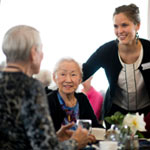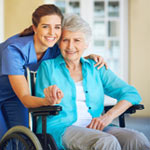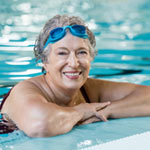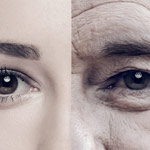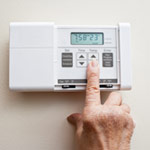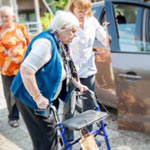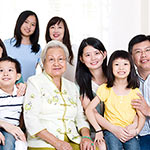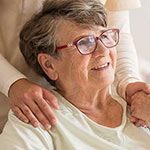Does Your Elderly Loved One Need More Care than You Can Give

At some point in life, you may become a caregiver to a senior parent with dementia, Alzheimer’s or another similar hardship. You may have to decide at some point if you can handle the care yourself or if you should leave your elderly loved ones to be cared for by someone else. Making this decision can be a complicated and emotionally wrenching experience both the caregiver and the senior parent. You may worry whether or not they will be safe? Will they wander off? Will they let strangers into the house? Will they turn on the stove and forget to turn it off?
Caring for a senior parent can be heartbreaking and challenging when the realization sets in that the strong, self-sufficient adult that has been there for years is no longer capable of taking care of themselves. It can also mean a real loss of freedom and flexibility and may require you to develop creative strategies to accomplish daily errands and tasks. For the senior adult with dementia, it can be equally difficult to acknowledge and accept that physical, emotional or mental changes have reduced their independence.
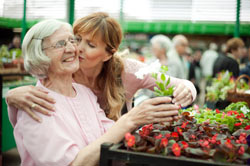
It is important to try to balance the safety of the senior with the needs of both the senior and the caregiver to retain as much independence as possible. As a result, you should include as many people as you can in the decision-making process, even the senior parent. You may also want to ask for guidance from other caregivers, such as family members and friends; paid caregivers who know the senior’s abilities and limitations; and elder care professionals such as doctors, nurses, and social workers.
There are some questions you can ask yourself that will help guide you in making a decision. If the answer to any question is “no,” it may no longer be possible for the senior to be left alone, even for a short period of time. Instead, moving into an assisted living facility may be an appropriate choice.
A few of the questions you may need to ask yourself may begin with does your parent or grandparent understand how to leave the home if necessary? Do they know where the door is located and how to exit the building?
Another question you may want to ask is will your elderly loved one stay home or near the house rather than wander off? If they go outside, do they know where they live and how to get back inside?
You might want to also think about whether or not your aging parent or grandparent can identify signals, such as smoke from the kitchen or fire alarms that would alert them to potential dangers? Do they know how to access emergency services and dial 911? Would they be able to communicate over the phone, and can they physically get to a phone no matter where they are?
It’s also important to decide if your loved one has frequent life-threatening medical emergencies that might require immediate intervention. Do they know where any medication they might need is located, and do they have the capacity to select the right medicines, as well as follow the directions on the prescription?
Another important question to consider is whether or not your senior family member has the judgment to identify who they should and should not let into the home including if they know to allow family, friends and emergency personnel in.
Can your elderly loved one prepare meals for themselves if they get hungry? Are they able to use the stove, and will they remember to turn it off? Another important question to think about is whether your parent or grandparent can get to the bathroom and use the toilet on their own. If not, alternatives have to be established.
A question perhaps not often thought of is will your loved one be afraid to be alone for an hour or more? Do they become clingy when caregivers depart and make frequent telephone calls if they are left alone?
After you have answered these questions and decide that it is still safe to leave your senior loved one at home alone, you should regularly re-evaluate their living arrangements to ensure their safety. You will also need to be aware of any changes in their condition and abilities. Pay attention to whether or not they seem to fear being alone, it could be a sign that at some level they know they are not capable of coping with any emergencies that might arise.
You might also be interested in...
-
 4 Important Safety Measures For Seniors
4 Important Safety Measures For Seniors
-
 5 Scams Seniors Should Watch Out For
5 Scams Seniors Should Watch Out For
-
 5 Telltale Signs It’s Time To Stop Driving
5 Telltale Signs It’s Time To Stop Driving
-
 6 Sports Seniors Can Enjoy
6 Sports Seniors Can Enjoy
-
 7 Ways To Feel Younger
7 Ways To Feel Younger
-
 Aging In America
Aging In America
-
 The Best Low Maintenance Pets For Seniors
The Best Low Maintenance Pets For Seniors
-
 Budget-Friendly Vacations with Perks for Seniors
Budget-Friendly Vacations with Perks for Seniors
-
 Can Eating Cherries Alleviate Arthritis?
Can Eating Cherries Alleviate Arthritis?
-
 How To Choose A Medicare Supplement Plan
How To Choose A Medicare Supplement Plan
-
 Could You Live On Social Security?
Could You Live On Social Security?
-
 Does Your Elderly Loved One Need More Care than You Can Give
Does Your Elderly Loved One Need More Care than You Can Give
-
 Is Your Elderly Parent Feeling Lonely
Is Your Elderly Parent Feeling Lonely
-
 Five Health Tips for Men over 50
Five Health Tips for Men over 50
-
 Five Health Tips for Women over 50
Five Health Tips for Women over 50
-
 Five Tips for Helping Seniors Stay Active
Five Tips for Helping Seniors Stay Active
-
 Helpful Tips for Adjusting to an Empty Nest
Helpful Tips for Adjusting to an Empty Nest
-
 Home Safety Checklist for Single Seniors
Home Safety Checklist for Single Seniors
-
 Home Safety Tips for Seniors Living Alone
Home Safety Tips for Seniors Living Alone
-
 How Seniors Can Improve Their Posture
How Seniors Can Improve Their Posture
-
 How Seniors Should Stock Their Kitchen
How Seniors Should Stock Their Kitchen
-
 How to Be a Good Husband in Retirement
How to Be a Good Husband in Retirement
-
 How to Change Your Life in 10 Days
How to Change Your Life in 10 Days
-
 How to Do Container Gardening for Seniors
How to Do Container Gardening for Seniors
-
 How to Find Happiness in Your Senior Years
How to Find Happiness in Your Senior Years
-
 How to Grow Easy Houseplants for Seniors
How to Grow Easy Houseplants for Seniors
-
 How To Help Your Senior Parent Stay Mentally Healthy and Happy
How To Help Your Senior Parent Stay Mentally Healthy and Happy
-
 How to Simplify Housekeeping for Seniors
How to Simplify Housekeeping for Seniors
-
 How to Stay Looking Sharp for Senior Men
How to Stay Looking Sharp for Senior Men
-
 The Importance Of Keeping Seniors Hydrated
The Importance Of Keeping Seniors Hydrated
-
 Is Chiropractic Care Safe For Seniors?
Is Chiropractic Care Safe For Seniors?
-
 Is Long-Term Care Insurance Necessary
Is Long-Term Care Insurance Necessary
-
 Patio Gardening For Seniors
Patio Gardening For Seniors
-
 Preparing For Retirement
Preparing For Retirement
-
 Pros and Cons of Living in a Retirement Community
Pros and Cons of Living in a Retirement Community
-
 How To Protect Seniors Against Identity Theft
How To Protect Seniors Against Identity Theft
-
 Senior Life Insurance Pays for Funeral Costs
Senior Life Insurance Pays for Funeral Costs
-
 Senior Summer Safety
Senior Summer Safety
-
 How Seniors Benefit From Adopting Senior Pets
How Seniors Benefit From Adopting Senior Pets
-
 How Seniors Can Decorate With Unique Framed Art
How Seniors Can Decorate With Unique Framed Art
-
 Seniors & The Social Life
Seniors & The Social Life
-
 Seven Power Foods for Seniors
Seven Power Foods for Seniors
-
 Tips for Seniors: How to Upgrade Your Bed for a Better Night's Sleep
Tips for Seniors: How to Upgrade Your Bed for a Better Night's Sleep
-
 Tips For Seniors On Improving Your Immune System
Tips For Seniors On Improving Your Immune System
-
 Tips for Seniors on How to Stock a Gift Drawer
Tips for Seniors on How to Stock a Gift Drawer
-
 Top Travel Safety Tips for Seniors
Top Travel Safety Tips for Seniors
-
 Understanding Medicare Part D Plans
Understanding Medicare Part D Plans
-
 Reasons Why An Elderly Loved One May Not Be Eating
Reasons Why An Elderly Loved One May Not Be Eating
-
 Why Seniors Need The Flu And Pneumonia Vaccines
Why Seniors Need The Flu And Pneumonia Vaccines
-
 You Won't Believe How Easily You Can Stall Aging
You Won't Believe How Easily You Can Stall Aging
-
 How To Choose Low Income Housing For Seniors
How To Choose Low Income Housing For Seniors
-
 8 Unique Gifts For Seniors
8 Unique Gifts For Seniors
-
 Activities For Senior Citizens
Activities For Senior Citizens
-
 7 Winter Safety Tips For Seniors
7 Winter Safety Tips For Seniors
-
 5 Questions To Ask When Considering A Continuing Care Retirement Community
5 Questions To Ask When Considering A Continuing Care Retirement Community
-
 How Long Should You Wait To Claim Social Security
How Long Should You Wait To Claim Social Security
-
 Signs And Symptoms Of A UTI In Seniors
Signs And Symptoms Of A UTI In Seniors
-
 How To Deal With The Emotions Of Retirement
How To Deal With The Emotions Of Retirement
-
 How To Help Seniors Fight Depression
How To Help Seniors Fight Depression
-
 How Seniors Can Save More Money
How Seniors Can Save More Money
-
 What Services To Expect From Assisted Living Centers
What Services To Expect From Assisted Living Centers
-
 How To Live A Long Life
How To Live A Long Life
-
 Top 3 Dental Risks For Seniors
Top 3 Dental Risks For Seniors
-
 Choosing The Right Assisted Living Facility
Choosing The Right Assisted Living Facility
-
 Different Ways To Ease Knee Pain
Different Ways To Ease Knee Pain
-
 Why Assisted Living Centers Allow Pets
Why Assisted Living Centers Allow Pets
-
 4 Surprising Health Hazards You May Have In Your Home
4 Surprising Health Hazards You May Have In Your Home
-
 5 Mental Exercises To Increase Happiness
5 Mental Exercises To Increase Happiness
-
 Why Seniors And Caregivers Need To Laugh More
Why Seniors And Caregivers Need To Laugh More
-
 How To Reverse The Effects Of Arthritis
How To Reverse The Effects Of Arthritis
-
 6 Exercises That Won’t Hurt Your Joints
6 Exercises That Won’t Hurt Your Joints
-
 Driving Safety Tips For Seniors
Driving Safety Tips For Seniors
-
 4 Natural Ways To Combat Feeling Dizzy
4 Natural Ways To Combat Feeling Dizzy
-
 Senior Life Insurance is a Worthwhile Investment
Senior Life Insurance is a Worthwhile Investment
-
 Tax Breaks Every Senior Should Know
Tax Breaks Every Senior Should Know
-
 How To Make Money During Retirement
How To Make Money During Retirement
-
 5 Phone Scams Targeting Seniors Now
5 Phone Scams Targeting Seniors Now
-
 How Technology Can Keep Seniors Safe
How Technology Can Keep Seniors Safe
-
 How To Not Go Wrong When Choosing A Nursing Home
How To Not Go Wrong When Choosing A Nursing Home
-
 Disaster Checklist For Seniors
Disaster Checklist For Seniors
-
 How Visiting Seniors Often Can Keep Them Healthier
How Visiting Seniors Often Can Keep Them Healthier
-
 How To Make A Senior’s Day
How To Make A Senior’s Day
-
 Internet Safety Tips Every Senior Should Know
Internet Safety Tips Every Senior Should Know
-
 5 Ways To Strengthen Aging Bones And Muscles
5 Ways To Strengthen Aging Bones And Muscles
-
 How Senior Yoga Can Be A Lifesaver
How Senior Yoga Can Be A Lifesaver
-
 Live Longer By Volunteering
Live Longer By Volunteering
-
 Managing Pain For Seniors
Managing Pain For Seniors
-
 6 Everyday Ways For Seniors To Stay Active
6 Everyday Ways For Seniors To Stay Active
-
 Bad Habits That Make You Age Faster
Bad Habits That Make You Age Faster
-
 Fall Prevention For Seniors
Fall Prevention For Seniors
-
 6 Ways For Seniors To Budget For Life Insurance
6 Ways For Seniors To Budget For Life Insurance
-
 Summertime Resources For Seniors & Caregivers
Summertime Resources For Seniors & Caregivers
-
 5 Simple Ways Seniors Can Get Free Help
5 Simple Ways Seniors Can Get Free Help
-
 Navigating Ride Programs for Seniors
Navigating Ride Programs for Seniors
-
 What’s Preventing You from Receiving Medicare Supplemental Insurance?
What’s Preventing You from Receiving Medicare Supplemental Insurance?
-
 Can You Outlive Your Life Insurance?
Can You Outlive Your Life Insurance?
-
 Medicare Part B Plus Medigap vs a Medicare Advantage Plan: Which is better?
Medicare Part B Plus Medigap vs a Medicare Advantage Plan: Which is better?
-
 3 Things to Know about Senior Life Insurance
3 Things to Know about Senior Life Insurance
-
 Do Medicare Supplement Plans Cover Pre-existing Conditions
Do Medicare Supplement Plans Cover Pre-existing Conditions
-
 What is Final Expense Insurance and Who Should Buy It?
What is Final Expense Insurance and Who Should Buy It?
-
 Does Medicare Pay for Prescriptions?
Does Medicare Pay for Prescriptions?
-
 Advocating for a Hospitalized Parent or Grandparent
Advocating for a Hospitalized Parent or Grandparent
-
 How Do You Choose the Best Medicare Coverage?
How Do You Choose the Best Medicare Coverage?
-
 Key Signs it’s Time to Get In-Home Care or Move to an Assisted Living Facility
Key Signs it’s Time to Get In-Home Care or Move to an Assisted Living Facility

 Insurance products are available in New York from
Insurance products are available in New York from  Insurance products are available in your state from
Insurance products are available in your state from 







